

CHAPTER FOUR – PROFESSIONAL SOCIALIZATION OF HEALTH CARE PROFESSIONALS – Creative Clinical Teaching in the Health Professions. “Thought flows in terms of stories—stories about events, stories about people, and stories about intentions and achievements.
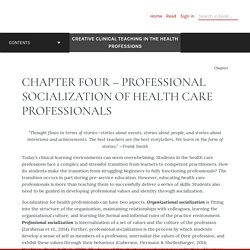
The best teachers are the best storytellers. We learn in the form of stories.” —Frank Smith Today’s clinical learning environments can seem overwhelming. Students in the health care professions face a complex and stressful transition from learners to competent practitioners. Socialization for health professionals can have two aspects. Professional socialization involves guiding learners to make personal commitments to their chosen profession. Here we assume that professional socialization is a desirable outcome. Professional Socialization. Professional socialization is considered a process that begins on day one of formal education programs and continues as learners graduate and enter the work force. Educators actively guiding learners towards professional socialization is generally agreed to be important. Creative Strategies Minute at the Movies Transformations. What are Digital Competencies by Bryn Mawr College. Skip to main content Coronavirus (COVID-19) Updates | More Information What Are Digital Competencies?
A framework of digital skills broken down in to five main areas of focus: Digital Survival Skills, Digital Communication, Data Management and Preservation, Data Analysis and Presentation, and Critical Making, Design and Development created by Bryn Mawr College. – nataliawo4
The framework (also available in the official PDF version) is a collection of digital skills, categorized into five main areas of focus.
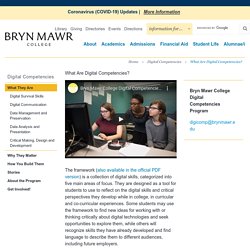
They are designed as a tool for students to use to reflect on the digital skills and critical perspectives they develop while in college, in curricular and co-curricular experiences. Some students may use the framework to find new ideas for working with or thinking critically about digital technologies and seek opportunities to explore them, while others will recognize skills they have already developed and find language to describe them to different audiences, including future employers. DigitalCompPentagonBMC.png Explore the following sections to learn more about the skills, find stories and student-curated resources, and more for each competency.
Bryn Mawr College Digital Competencies Program digicomp@brynmawr.edu Report a website issue Privacy Policy. Digital Content Curation: More Important Than Ever by KayO. Feature image sourced from the Public Domain shared by Coltsfan I’ve been a fan of digital content curation for a long time.
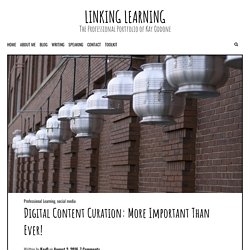
I’ve blogged about it on many occasions; first waxing lyrical about Diigo way back in 2011, then celebrating the new year in 2013 by suggesting resolutions to use curation to manage content overload and then reflecting on curation as an art form last year. So what could I have left to write about, five years after my original post, and is digital content curation even relevant half way through 2016? I have been reflecting on this question for a few days now, and I have come to the conclusion that there is still a lot that may be written about this topic, much to be learned, and that it is more relevant now than ever before.
There has been, however, a slight change in focus for my writing on digital content curation. Teaching students how to curate digital resources is a meta-skill, that actually requires them to be digitally literate in a number of different ways. What Is Social Media by Daniel Nations. Social media is a phrase we throw around a lot these days, often to describe what we post on sites and apps like Facebook, Twitter, Instagram, Snapchat, and others.
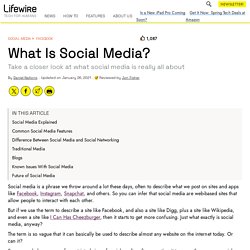
So you can infer that social media are web-based sites that allow people to interact with each other. But if we use the term to describe a site like Facebook, and also a site like Digg, plus a site like Wikipedia, and even a site like I Can Has Cheezburger, then it starts to get more confusing. Just what exactly is social media, anyway? The term is so vague that it can basically be used to describe almost any website on the internet today.
Or can it? Some people have more of a restricted view of social media, often equating it to mean the same as social networking (a.k.a. It seems as if everyone has their own personal opinion of what social media is and isn't. Nurse who 'vented' online found guilty of professional misconduct. A Saskatchewan nurse who used Twitter and Facebook to express concern about the quality of care given to a family member in a nursing home has been found guilty of professional misconduct, according to a recent decision by the body that oversees nursing in the province.
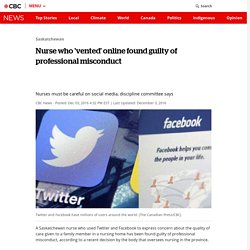
The case concerns posts by Carolyn Strom, a registered nurse who commented on Facebook in February of 2015. Her post both criticized and praised staff at St. Joseph's Health Facility in Macklin, Sask., about 250 kilometres west of Saskatoon. Facebook post leaves Prince Albert, Sask., nurse charged with professional misconduct "My grandfather spent a week in palliative care before he died and after hearing about his and my family's experience there, it is evident that not everyone is 'up to speed' on how to approach end of life care or how to help maintain an ageing senior's dignity," Strom said online.
Her posting was also shared on Twitter. "Ms. "The Discipline Committee accepts that Ms. Social Media Professionalism in the Medical Community.